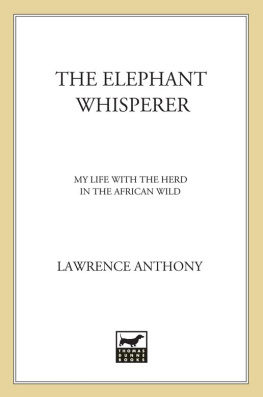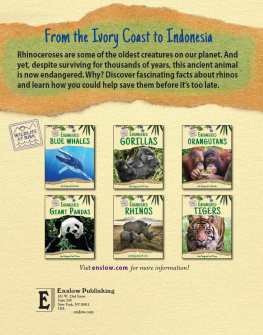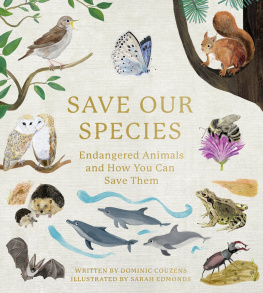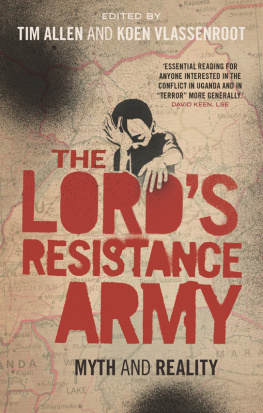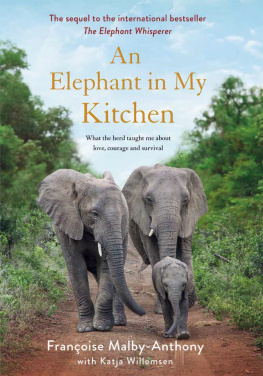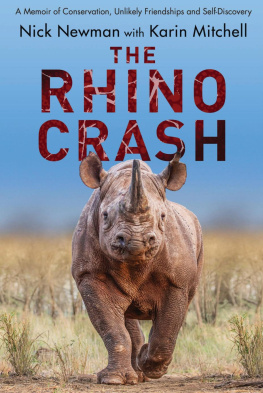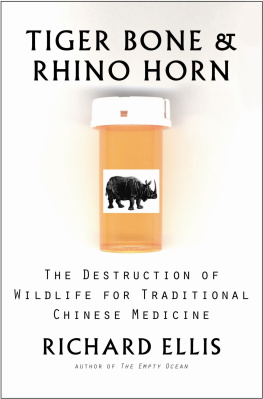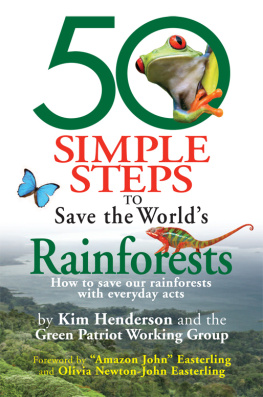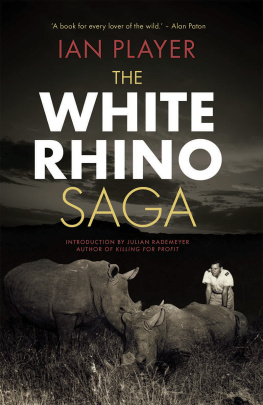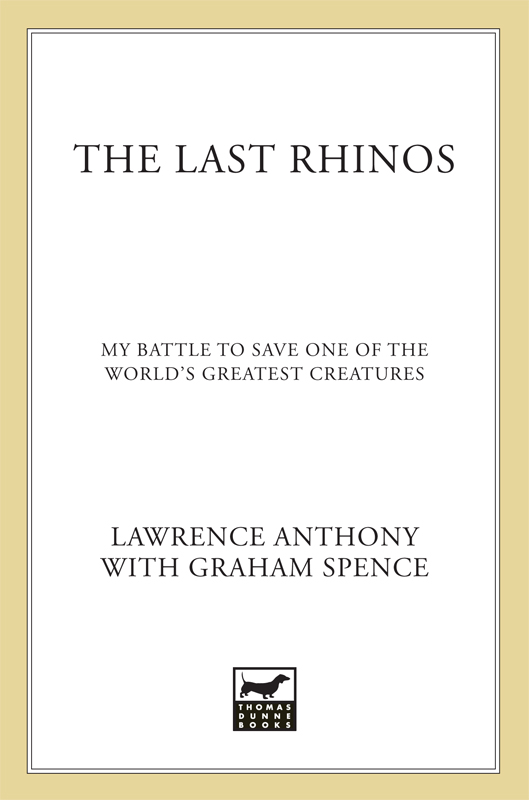
The author and publisher have provided this e-book to you for your personal use only. You may not make this e-book publicly available in any way. Copyright infringement is against the law. If you believe the copy of this e-book you are reading infringes on the authors copyright, please notify the publisher at: us.macmillanusa.com/piracy.
C ONTENTS
This book is dedicated to the courage of Ian Player, Nick Steel, Kes and Frazer Hillman-Smith and those other brave men and women who spent their lives trying to protect and save one of the most magnificent creatures ever to have graced this earth: the rhinoceros.
The author condemns past and present governments of Vietnam, China, Myanmar, Indonesia, Thailand, South Korea,Taiwan and Malaysia who have failed to take effective action to end the superstitious use of rhino horn in so called traditional medicine. Their criminal neglect has driven the rhinoceros to the very brink of extinction all over the world.
C HAPTER O NE
It was barely light when the radio first crackled into life.
Code red! Code red! Come in, Lawrence, come in. Over.
Standing by.
Bad morning. The caller paused. We have a dead rhino at Hlaza Hill. A female. Over.
Dread froze my blood. I looked up at the sky above the distant Hlaza Hill, the highest point on the new community game reserve that abuts Thula Thula, my own reserve and my home in Zululand, South Africa. There were no vultures and no gunshots had been reported, a sound that echoes like a thunderbolt across the African wilderness when the wind is right.
Cause of death? I asked, fearing the worst.
Poachers. Both horns are gone. Theres blood all over the place. Professional job. Looks like they used an AK-47, or maybe an old military-issue R1.
I could feel my fists clenching. Rhino poachers the disease of the wild that was now becoming a pandemic.
How long has she been dead? I asked.
Cant be more than a few hours. They probably took it around midnight. There was plenty of moon to help them.
OK, Ill be there now. Out.
I glanced at the pump-action shotgun leaning against the passenger seat of my Land Rover, reached for the ammunition box and stuffed my pockets with handfuls of SG cartridges. I hoped against hope that the poachers were still on the reserve.
The green-black flies were already gathering when I arrived at the hill. The air was metallic with the rank smell of blood. The rhino lay uncharacteristically on her side, legs splayed awkwardly at right angles to her stiff body.
I got out of the Land Rover and walked across to the three rangers standing nearby. Nobody said anything. The shock of the kill, the dominating presence of the huge dead creature, stifled our words.
Rhinos have an ancient, eternal beauty. With their massive bodies, clad in thick folds of prehistoric body armour topped by a magnificent scimitar horn, they fascinate like few other creatures. Weighing up to three and half tons and reaching six feet high, they are the largest land animal in the world after the elephant.
In death, there was no trace of that beauty. The regal horns, viciously hacked off with honed machetes or pangas , as we call them in Africa left the noble face crumpled and desecrated. The eyes gazed vacantly. Pools of blood had congealed around the grotesquely disfigured head. Without its horn, the imposing creature looked as vulnerable as a baby.
I could see my own turmoil mirrored in the rangers faces. In Africa, the war against poachers is intensely personal. There are two types of poacher: the local tribesman looking for something small for the pot; and the heavyweights, the professional killers, who want rhino horn and elephant ivory, who will shoot a ranger then brag about it. Poaching any animal is a crime, but killing a rhino or elephant is not shooting to feed a hungry family. Its blood money. And its an intimate, violent invasion of our lives.
Who found the body?
Bheki, my most trusted ranger, looked up and pointed at a young Zulu guard, Simelane, standing a little way off. I beckoned for him to come over.
Sawubona , Simelane, I greeted him. What happened here?
Sawubona , Mkhulu. I was on patrol when I saw the dead rhino, he replied quietly, staring at the ground.
Who was with you?
I was alone.
You were on patrol out here all alone? I asked, surprised. Poaching patrols always consisted of two armed men.
Yes, I was alone. He was barely whispering.
I was about to press on with the questioning when a loud Zulu voice interrupted me.
Mkhulu, there is too much blood.
It was Bheki, down on one knee closely examining the rhinos head.
There is too much blood, he repeated. That means they were in a hurry. They took the horns while she was still alive. Maybe unconscious, but alive.
For a moment we just stared at Bheki. Then it sank in. These monsters had hacked the horn off a living animal.
Which way did they go? I asked Bheki, who had been at my side in several firefights with poachers over the past decade.
He pointed east. Four, maybe five hours ago.
That meant that unless they were in hiding, they would be almost out of the reserve and heading towards the townships, where we would never catch them. However, that didnt mean we wouldnt try. At the very least, it would give us something physical to do to vent our fury.
OK, we all know the drill, I said. These guys are probably carrying AKs and we all know what that means. If we make contact and they so much as think of lifting their rifles, shoot fast and shoot first, as well be up against automatic fire.
I looked at the solemn faces. Armed only with shotguns and Second World War-era LeeEnfield .303 bolt-action rifles, they were completely out-gunned, but that would not deter these hard, dedicated men for a moment. They would be facing automatic weapons, replying as fast as their wrists could work their rifle bolts. You cannot imagine the courage that takes. I had a pump-action shotgun that was fast and deadly and spread nine lead balls in a lethal cluster. Our weapons complemented each other well. The .303s had a longer range than an AK, and the shotguns at close quarters in thick bush didnt miss. Used in tandem they were a match for the illegal AK-47s so favoured by poachers. Bring your own water and keep your safety catches on. Lets go! We would be moving as fast as we could in thick bush, and I didnt want anyone tripping and blasting the person ahead of them.
The going was tough and by mid-morning we were well off the beaten path, following barely discernible game trails used by the poachers. The sun burned relentlessly, a typical Zululand scorcher, and sweat poured from our bodies, stinging our eyes and drenching our shirts. But hyped up with adrenalin and anticipation, we never eased our blistering pace. If we faltered, any slim chance of catching them would be lost.
Its difficult to remain calm when you see a rhino brutally slaughtered for a horn that consists of little more than keratin, the same fibrous structural protein you find in hair and fingernails. In fact, its impossible. Youre more likely to be consumed by raging fury, but that wont do any good. Rhino horns are used for mythical medicinal purposes in countries across Asia, as part of their traditional healing systems. In traditional Chinese medicine it is believed to cure types of fever, for instance. And the increasing wealth of these economies has created an insatiable demand. Tens of thousands of rhino have been killed in Africa, with several subspecies hunted to extinction. The demand is reminiscent of a nineteenth-century gold rush, and with good reason. On the streets of China or Vietnam, ounce for ounce the horn is more valuable than gold. If you truly want to grasp the situation faced by conservationists, do what a poacher does and look at a rhino and see a three-foot-long horn made of pure gold. Game rangers are in the unenviable and extremely hazardous position of trying to protect solid gold. What should be locked securely in a vault instead walks around on four legs in the bush.


